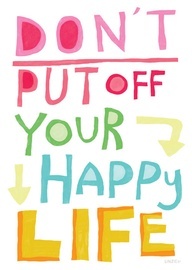Choosing Happiness
For years, research has suggested that the happier and less stressed we are, the less likely we are to get sick, develop long-term health issues and lead more fulfilled lives. The more pessimistic, stressed out, and lacking in self-confidence we are, the more health hazards come our way. From stroke, heart attacks, depression, even cancer, many studies suggest that a happier life leads to lower risks for developing such health problems.
It can be habitual for some to look at the glass half empty, going through each day as if it is a burden, and consequently impacting their relationships with others and themselves. A lack of self-confidence leads to low self–esteem, fear of failure, negative expectations, self doubt, and unhappiness.
Happiness is a Choice
You can choose to hold on to things in the past; negative thoughts about yourself, others, or a situation, and stay stuck (which is exhausting). The alternative is to try to see the lesson in a challenging situation, take baby steps towards forgiving someone who hurt you, and move forward. Holding onto this anger or sadness is likely not serving you; focus on things that will make you a happier, more positive person. Stop sabotaging your happiness by past experiences or current stressors.
Personally, I know how difficult this can be. At times, something out of your control occurs and all you want to do is lament in the sadness or feel bad for yourself, but it doesn’t help.
Recently, I experienced how hard this can be. I took a few days to be sad and was really hard on myself. Looking back, I see how this was a habit I learned as a teenager, but it wasn't effective in my adulthood.
I realized this a few days into my misery and decided to take an adult step out of sadness and self-deprecating talk. I got tired of feeling bad. I started slowly looking for more happiness to fill my emotionally drained “bucket”. Rather than noticing all the negatives in my day, crowded subways, clients cancelling, or focusing on the challenging event, I began looking at these experiences as opportunities. It was just too tiring to be negative all the time. I get to walk and explore the city, since the subway was a mess. I can spend more time catching up on my writing or conquer that to-do list, rather than getting frustrated about a client I can’t control. I can look for beauty in any situation around me. I have learned through this crummy experience that I can control my happiness, which increases my confidence and knowing I can handle what life throws my way.
Seek Out Happiness
- Surround yourself with positive people. If you notice there are people around you that are “Debbie Downers”, sucking the life out of you, choose to spend less time with these people. Spend time with those who fill you up, motivate, and enhance your life.
- Workout. Even just a quick walk can increase serotonin, the “feel good” neurotransmitter. Often times, when we are a crummy mood, we just want to sit in it. Don’t! This is your lack of confidence or negative self talk. Ask yourself, how does this serve me? It doesn’t. Get out and get moving.
- Be kind to others. Opening doors, smiling, asking someone how they are doing, telling someone you appreciate their time are simple acts of kindness that can brighten someone's day, and yours as well.
- Get mindful. Mindfulness, being aware of the present moment, is a great way to let go of what is to come and what has been. Practicing mindfulness daily can increase confidence, decrease negative self-talk, and actually enhance your immunity. When we are focused on stressful life events, this effects our entire body. Focus on the now and learn to turn off some of the negative “noise” in your mind. Try a yoga class, YouTube mindfulness exercises, or meditations.
- Log off. Get off the computer and the internet for a few hours (this means Facebook, too), put your phone on silent, and put it in a drawer. Take a hiatus from technology for a little while and focus on you. Being attached to technology can make us spend time comparing, expecting, and doesn’t allow us to focus inward. Take a break for yourself.
- Make a part of your home beautiful. This can be as small as a drawer or a corner of your room. Make this a visually appealing place, clean up clutter, put a nice picture or flowers there. When you look at this area, smile.
Bottom line, happiness is your choice. If you want to start to feel more true confidence and love within yourself, start with small steps towards living a happier, healthier life.
Take Good Care,
Emily
Emily is the author of Express Yourself: A Teen Girls Guide to Speaking Up and Being Who You Are.You can visit Emily’s Guidance Girl website. You can also find her on Facebook, Google+ and Twitter.
APA Reference
Roberts, E.
(2012, September 26). Choosing Happiness, HealthyPlace. Retrieved
on 2026, March 4 from https://www.healthyplace.com/blogs/buildingselfesteem/2012/09/choosing-happiness
Author: Emily Roberts MA, LPC
While I do like the suggestions about doing small stuff to make oneself happy I'm not sure I agree wholeheartedly about the 'choosing to be happy' part. For me I am learning in therapy how to view my past differently so it doesn't dictate to me who I am today and in the future. Personally, I can't just say to myself despite the abuse/trauma/etc. I simply choose to ignore it and be happy. I'm not trying to be offensive or start an argument here. I just wanted to present how things have affected me. I understand that what works for some people will not always work for others and that everyone's experience is unique to them. Thanks.
Thank you for your view. These post are extensions of others I have written on self-esteem. Only so much can be in one post in fact less than 800 words- therefore each week I attempt to discuss a topic or skill that meets the needs of particular populations- this weeks may have not been for you, please see my previous posts for more specific suggestions that may meet your needs. The intention of this post is to give readers my personal and professional views on making subtle shifts to living a happier life. I hope you find one that fits for you.
Take Good Care,
Emily
In my psychology 101 textbook, Discovering Psychology, stress, its influences on health, and coping mechanisms are covered in chapter twelve. Significantly stressful events, chronic stress, and even minor, everyday stressors weaken the body and make it more vulnerable to illness.
Corticosteroids help provide protection for the body when it experiences chronic stress; however, having high levels of corticosteroids in the body for an extended amount of time can result in lowered immunity and increased susceptibility to illness. Even typical stressors, such as exams for students, can decrease the immune system's effectiveness. Stressed people are more likely to become ill, and stress even interferes with the effectiveness of vaccinations. Also, recovery times are longer for those who are stressed.
However, like the article discusses, there are ways to decrease stress and choose happiness instead. There are maladaptive coping practices that only serve to increase stress, such as such as responding to stress pessimistically or avoiding a problem that needs to be faced head-on. However, there are many effective ways to cope with unhappiness, as well.
The book's suggestion aligns with that of the article about seeking positive people, as those with more and different types of social support tend to have better health. The book and article both also recommend exercise, which can increase your mood by releasing serotonin, dopamine, and endorphins in your brain.
Both the book and the article recommend mindfulness and meditation as techniques to deal with stress, increase happiness, and improve health, as "mindfulness" calms the mind and helps keep focus on the present moment.
The article suggests that being kind to other people might increase happiness, as well; according to the textbook, hostile people are more likely to develop heart disease, possibly because of more vehement reactions to stress or simply due to producing more stress in their lives, so being more kind and less hostile has a positive affect on health as well.
The article says to focus on the positive aspects of stressful situations; the book also suggests this and calls it positive reappraisal. Finally, the book suggests that getting enough sleep and avoiding stimulants can also help reduce the negative effects of stress. In these ways, happiness can be chosen, leading to positive mental and physical health benefits.
I like your work Emily. We follow each other on twitter and I read a lot of your blogs and articles. I have a massive interest in psychology and am totally with you on mindfulness and being kind to others, as mentioned above. I was wondering however what your views are on self-compassion vs self-esteem?
Being a golf pro I work with a lot of golfers of varying abilities, some of whom compete at a very high level in England. I apply ways of increasing their self-esteem prior to a big tournament, while self-compassion for the post evaluation. Would you agree one is applicable at certain times or can an individual gain SO MUCH confidence from constant feeds of self-esteem that this is all they need to succeed?
I suppose with golf it can be a bit of both but I'd love to hear your professional thoughts :)
Many thanks,
Luke Peterken
